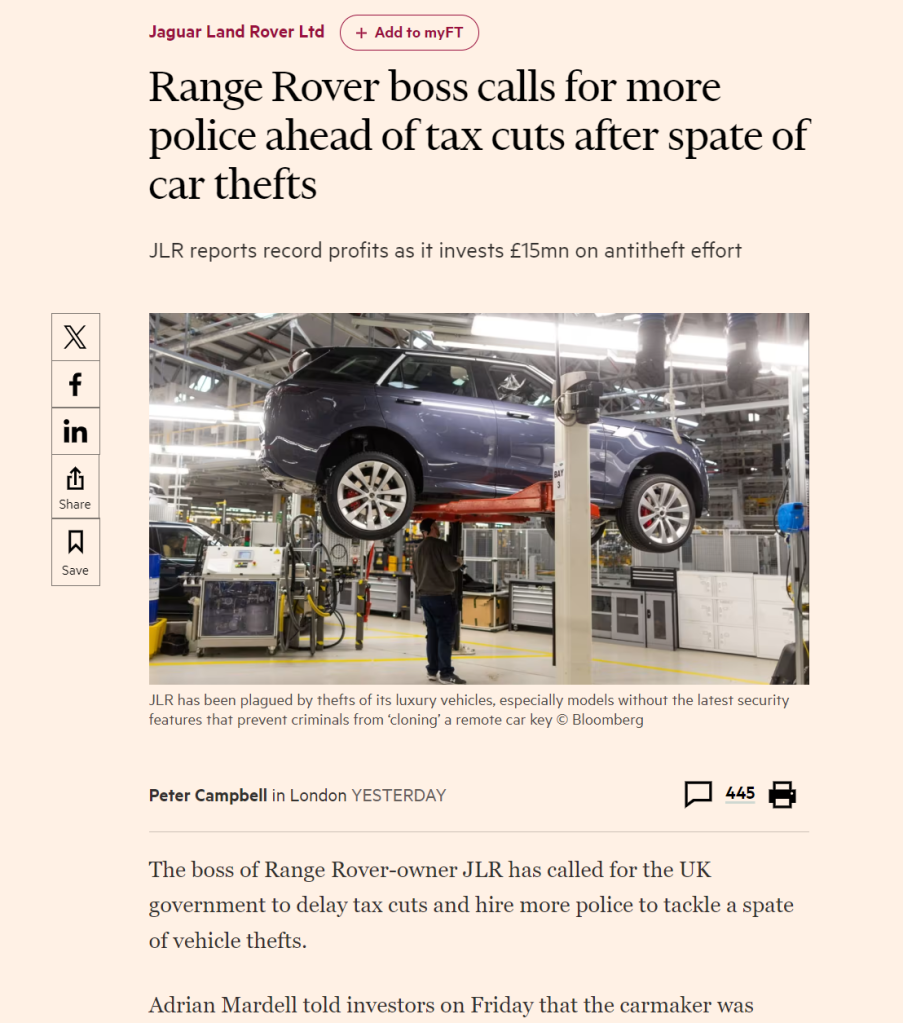An interesting story emerged this week as the head of a corporation called for greater investment in policing, favouring social cohesion and safety over the proposed tax cuts being prepared by the UK government.
This story was interesting on two levels. First, this is not the kind of story one generally tends to hear, but which has become more frequent, alongside other calls for greater social investment, a sense of responsibility and the need for additional social contribution by the corporate sector. Some will have seen the stories in the past few weeks of the rich on demos requesting that they be taxed, rather than exempted!
Perhaps the second and even more interesting side of this story was that the boss involved was that of Jaguar Land Rover and that the call for greater policing was due to relatively significant levels of thefts of their most coveted models by organised criminals. At this level the story was actually one of fairly clear self-interest since the group have been spending millions on security at ports to prevent thefts to offshore locations.
The story nevertheless speaks to a deepening concern about the palpable lack of capacity by the state to maintain core functions that include policing, but also others like healthcare, social care, education, the maintenance of the public realm, transportation and so on. In fact the list has become almost endless with key departments and functions like taxation, the regulation of housing and funding schools seen to be almost threadbare. Today the ability of many funding-deprived local authorities to provide almost anything beyond refuse collection, to say nothing of the rising numbers of bankruptcies, heralds an end to the presence of a caring ‘they’ (when are ‘they’ going to fix this road, sort that school…).
The general feeling today, now observed from the social apex to those who rely more directly on public services and provision, is that state capacity is so fatally wounded that a return to arguments for taxation and spending are not so much compelling as simply critical to ensure the basic functioning of society.
Risks and problems are ‘leaking’ from austerity-wracked spaces and groups to those much further up the wealth and income distribution. This has occurred as public value has been siphoned by shareholders, government (passing on the dividends of privatised utilities and services), allowing shoddy work through deregulation, passing on gilded contracts to incapable providers, and feeding the massive growth of landlords drawing unjust rents for poor or dangerous conditions.
A tilt point has occurred where even the first class passengers are now feeling the lurch of the vessel and the risk of going down with her. This relationship of wealthier groups to society had become more elastic as private services and spaces became rivalrous to the public domain, but there is only so far that such forms of escape (private health insurance, dentists, public schools) is possible. It takes the story of the theft of designer Defender’s to really tell us how bad things have become. This case speaks of a much deeper dissolving of the social contract and a kind of lawless and social care-lessness as a result – the rise of contract criminals, the incapacity of formal policing agencies, and the ultimately the need to reinvigorate the state as a means to reinstall the dignity and safety of all.
Link – Range Rover boss calls for more police ahead of tax cuts after spate of car thefts

